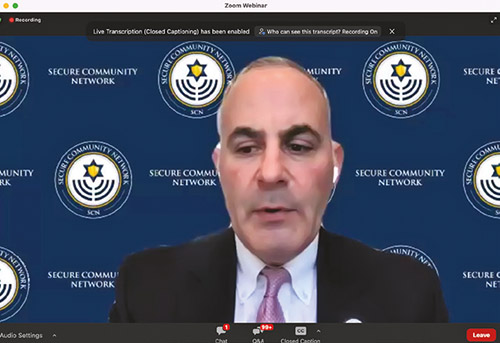


One positive outcome from the Colleyville, Texas, hostage crisis has been renewed attention to the different security training sessions offered by respected national Jewish organizations.
In this vein, Jewish Federations in New Jersey offered a free Secure Community Network (SCN) webinar, “BeAware: An Introduction to Situational Awareness” on Thursday, January 27. According to one of the SCN officials speaking in the webinar, over 9,000 viewers participated in the session.
SCN Director and CEO Michael Masters welcomed viewers, noting the troubling rise in antisemitism and hate crimes across the nation. He stated: “Israel has the Iron Dome (missile defense system). We’re working on building a security dome over North American Jewry.”
Masters introduced the BeAware webinar facilitator, Stuart Frisch, noting that he has held senior security roles in the Memphis, Tennessee, police department and the Israeli Defense Forces, and he is a certified trainer with the United States Department of Justice and the Department of Homeland Security. Frisch defines “situational awareness” as always being aware of what is occurring around you or, as the FBI terms it, “mental defensive driving.” He started his presentation by offering an example of what situational awareness entails. When entering a large public facility, someone who is situationally aware will quickly scan the premises for all the exits and for rooms (like bathrooms and closets) that can serve as hiding places. They will also make a point to not allow distractions to this prescreening, either from other people or from their own electronic devices.
Frisch stated that there are three categories where the need to exercise situational awareness is most needed—around people, activities and vehicles. He stressed that those exercising situational awareness must trust their own definitions of what is normal in a given situation; if something seems “off,” they must “commit to action” and contact law enforcement.
To build their observation skills, Frisch suggested that viewers adopt the practice of consciously taking note of 10 details about their environment whenever they step out of their car. He also cautioned viewers that their emotions can affect their awareness and to do their best to clear their heads, to stay more aware of their circumstances.
To illustrate the value of the maxim to “commit to action,” he shared an experience from officers’ school in the IDF. An instructor told a story of seven frogs sitting on a log in a lake and four decided to jump off. He asked the officer candidates how many frogs were left on the log and many said “three.” He answered that there were seven frogs on the log, because deciding to act is not enough. You have to actually go ahead and act.
Frisch spoke about the objectives of “being aware” and stressed that the goal is to be able to describe questionable characters, their clothes, their actions and any objects they have on hand with as much detail as possible. He urged viewers to not be worried about being politically correct in offering an identifying description and to pay attention to all details, such as the kind of shoes the suspicious person was wearing.
Speaking about being aware of unusual activities, he asked viewers to ask themselves: What is happening? When? Where? Why? Who is involved? Has this happened before? Was someone armed and, if yes, with what? If a suspicious person left, how did they leave (on foot or in a vehicle) and in what direction?
Speaking about being aware of suspicious vehicles, Frisch urged viewers to scan for the type of vehicle, the color, make and model, a license plate number (this is particularly important), the number of occupants and descriptions of them and identifying features or decorations on the vehicle.
Frisch also discusses how to be aware more effectively in gas stations, rural areas, on the internet, at ATMs and in crowds. He encouraged viewers to also prize their personal physical safety above all else and to scan around themselves as they go about their business. He urged people to never allow themselves to get in the middle of a crowd but, rather, to stay at the periphery as this allows them more options.
The Jewish Federations offered the BeAware webinar as part of a continuing series of security workshops for their communities, as well as a comprehensive range of efforts to enable Jewish institutions to buttress their security and to obtain state and federal grant funds for security.
In Middlesex and Monmouth County, the Jewish Federation in the Heart of New Jersey’s activities include sponsoring a “Countering Active Threats Training” on Tuesday, February 15, offering a pre-recorded training on deescalation, a six-month series of workshops on how to proactively push back against antisemitism with next events on February 23 (student advocacy), March 30 (enlisting allies), April 27 (addressing online hate) and June 15 (recap and action steps), as well as successful efforts to bring in $9 million in security grants to dozens of Jewish groups. For more information, please see https://www.jewishheartnj.org/security.
Harry Glazer welcomes feedback on this news story and can be reached at harryglazer615@gmail.com.














